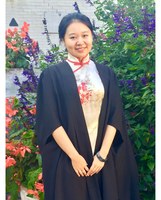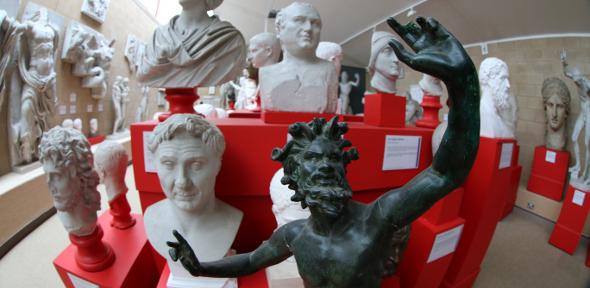
Current and incoming PhD Students
Below are some profiles from graduates past and present. A list of our current graduate students (and their research interests) can be found here.
Chiara Blanco
Chiara is in the writing up year of her doctorate in ancient philosophy. She is part-funded by a Levy-Plumb Scholarship from Christ’s College and, since 2015, has worked as a Faculty Graduate Teaching Assistant
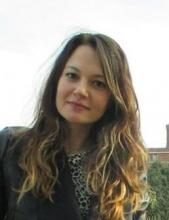 I moved to Cambridge in January 2014 after completing previous degrees in classics at the University of Siena (Italy) and Durham University (UK). My strong passion for classical culture - that also led me to author my first book - brought me to Cambridge University to begin the adventure of a PhD in Classics! What I have found here in both the vibrant city and university, is a great place to live and to study – I couldn’t have made a better choice.
I moved to Cambridge in January 2014 after completing previous degrees in classics at the University of Siena (Italy) and Durham University (UK). My strong passion for classical culture - that also led me to author my first book - brought me to Cambridge University to begin the adventure of a PhD in Classics! What I have found here in both the vibrant city and university, is a great place to live and to study – I couldn’t have made a better choice.
In my Faculty I have been warmly welcomed into an environment, able to stimulate and involve doctoral students in a manner of ways. As an example, there are weekly seminars (across the different sub-disciplines) organised by the Department, and regular conferences and invited talks, which allow for lively exchange and debate among students and scholars. I am well catered for in terms of resources with access to well-stocked libraries full of friendly and helpful staff, funding to travel to conferences and research meetings, and, above all, a supportive and stimulating environment in which to foster my academic development.
Tatiana Bur
Tatiana is in the second year of a PhD in ancient history, funded by a Sydney Travelling Scholarship (the Cooper Graduate Scholarship) and the Faculty
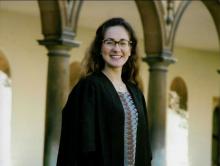
After completing my BA and MPhil at the University of Sydney, I joined the University of Cambridge in 2016 to begin my PhD. I had never set foot in Cambridge before moving here: in many ways a leap of faith, but it has exceeded expectations on all fronts.
From across the globe, I was initially attracted to Cambridge for the calibre of the Faculty staff. My supervisor is not only the fountain of knowledge I had anticipated, but is also supportive and generous with his time. Other members of the Faculty, too, take a genuine interest in the work and progress of the graduate students. I find it constantly humbling to have so many world-experts on the classical world under the one roof.
My research looks at the ways in which divine awe was humanly manufactured in ancient Greek religion. To make sense of one aspect of Greek history – the intersection of technological ingenuity and religious experience – I am examining both ancient literature and material culture, delving into anthropology and religious studies, exploring the world of ancient science. True to its reputation, I have found Cambridge to be the perfect place to undertake interdisciplinary work. The Faculty library has a very large, up-to-date collection, and the University has a host of other accessible libraries making research smooth and efficient. During term-time there are a variety of weekly Faculty events which give graduates the opportunity to hear current research from across the globe and across a range of areas relating to the classical world.
Best of all, it didn’t take long to strike up lasting friendships with other graduate students in the Faculty. Being surrounded by brilliant, like-minded people is stimulating and inspiring, and it’s difficult to overstate the value of a supportive group of graduates who are there to talk through (or distract you from) the PhD process over a coffee and/or a pint!
Robert Rohland
Robert is in the third year of a PhD in Latin literature, funded by CSAH (the Cambridge School of Arts and Humanities)
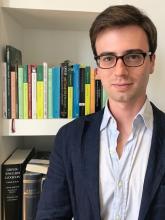
I came to Cambridge in 2015, after I had completed Classics degrees in St Andrews and Oxford and my secondary education in Germany. In my thesis, I am interested in the motif of carpe diem and in finding out which conceptions of present time carpe diem texts reveal. Working with both Greek and Latin texts and literary as well as epigraphic sources, I soon saw that Cambridge is the ideal place for such research. Indeed what makes the Cambridge Classics Faculty truly outstanding is that it is home to a great number of world-leading academics and yet a space where it is surprisingly easy for everyone to know one another. This integrated nature of the department also shapes the graduate community. Graduate students organise weekly interdisciplinary seminars, in which MPhil and PhD candidates can present their research. Not only is this an ideal place to present emerging research in a supportive environment, but it is also fascinating to see the wide range of classics there: there might be a presentation on Hittite language and another on the reception of statues in the 18th century within a single hour.
Every graduate student can tell of a particularly inspiring conversation with their supervisor. But there are some additional less well-known perks about studying classics in Cambridge: the faculty grants out of hours access to its library, so that grad students can access the rich resources whenever it is necessary. And thanks to the very generous travel grants, they can take part in fascinating conferences/excavations all over the world.
The irony of my work is not lost on me: working on carpe diem and the pleasures of wine and song, I spend a great part of my time in a library that is strictly silent and where one is not allowed to drink coffee, let alone wine. Fortunately Cambridge also has a lot to offer for enjoying one’s spare time: whether it is catching up at the pub with the fellow grads, or the numerous events organised by the College. Indeed for many students the College soon becomes the centre of their social life, where they can meet a diverse group of people studying any subject imaginable and engage in activities as different as cake-making or punting!
Hanneke Reijnierse-Salisbury
Hanneke did the Cambridge MPhil and is now in the second year of a PhD in Roman art and archaeology, supported by a mosaic of funding, including money from Newnham College, Cambridge, the Faculty, and the Scottish International Education Trust
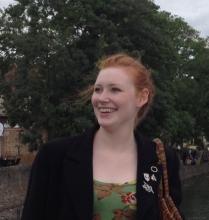
I arrived in Cambridge in 2011 to start an undergraduate degree in Classics and haven't left since! Having completed my MPhil here I am now embarking on a PhD in the Classics Faculty.
While the Cambridge system means there is the opportunity to engage in college life, the Faculty additionally provides a great central place for both work and the social life of the graduate community. I have found this community incredibly supportive, and my two years as a graduate student have greatly increased my confidence – both in my research and more generally. Throughout the week in term time there are always interesting seminars and talks to go to which are a good way to expand your horizons at a time when research is becoming more and more niche. As part of this there are plenty of opportunities to present work and share ideas with graduates and senior members alike.
My PhD looks at representations of the body in Romano-British sculpture and mosaics. My first year has so far allowed me to explore areas of ancient art and culture that I had never delved in to before, which has been really exciting. I have also really enjoyed the chance to speak to a variety of people about my research. I am thoroughly looking forward to continuing my studies, and am really excited to be given the opportunity to start teaching this year, testing some of my ideas in the supervision-room.
Joe Grimwade
Joe has just completed the Cambridge MPhil and is starting a PhD on Roman cultural history, funded by one of the Faculty’s new Buckley Scholarships
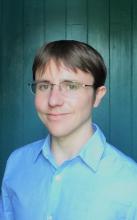
Before beginning university, I had little experience of Classics; I completed my undergraduate degree at the University of Warwick before moving to Cambridge for my MPhil. I am now embarking upon a PhD, during which I shall develop my research into memory studies and mnemonics in the ancient and modern worlds. While the learning curve has sometimes been (necessarily) steep, I can recommend the experience to anyone.
You will get the most out of the Cambridge MPhil if you have research ideas that you want to pursue. The course is tailored to equip you, the student, with the knowledge and skills required to conduct your studies, with access to courses in languages, both ancient and modern, multiple weekly seminars, any university lectures, plus training in specialist disciplines such as numismatics or epigraphy. You will work closely with your supervisor throughout the year, and have the chance to present your ideas to peers for feedback. The graduate community at Cambridge is as supportive as it is respected.
The resources are fantastic, and thanks to Cambridge’s many libraries, I have never been in a situation where I can’t track down a specific book or article. The breadth and depth of expertise in the Cambridge Faculty is deeply impressive, and extremely useful – there’s always someone who knows, or knows where to find, the answer to your questions. This diversity is perhaps the best thing about the Faculty. You will find yourself involved in stimulating discussions on novel subjects, and will no doubt be inspired.
Rebecca Lees
Rebecca (Bex) is currently entering the writing-up year of a PhD in Latin literature and gender, funded by the Arts and Humanities Research Council
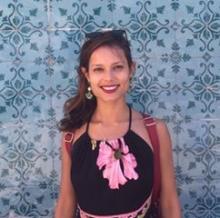
Since my undergraduate degree is from Oxford and my Master’s from Durham, one could be forgiven for thinking that I did not branch out when I decided to move to the “bridge” in “Doxbridge” for my PhD.
And yet Cambridge is where I have felt the strongest sense of a Classics community. Undergraduates, postgraduates and academics alike sit alongside one another in an open-plan Classics library, in the same building where both lectures and our cast collection are held. Straightaway I realised the value of having us all under one roof. It’s a community I appreciate so much that I’ve been the Graduate Representative for two years running.
The world-class supervision and facilities here go without saying; others will tell you how stimulating our seminar series and regular pub trips are. For me, one of the biggest benefits of moving to Cambridge has been the unique opportunities I’ve found here to help shape my career after the doctorate.
I’ve gained a fantastic insight into an academic career in Classics from presenting and teaching opportunities found only here. Courtesy of generous funding from both the Faculty and my College, Newnham, I’ve presented my research at international conferences in Toronto, Seattle and Tel Aviv. The supervision system at Cambridge has enabled me to teach a medley of undergraduate courses, from Latin literature to Greek prose composition, to students with Latin and Greek A-levels or equivalent and those learning the languages for the first time.
My research analyses grammatical gender dynamics in Ovid’s Metamorphoses, which may sound rather opaque. But it’s taught me how language encodes and perpetuates gender stereotypes and biases, and how we have the power to burst pernicious binaries with the language we use. From my rather niche-sounding research it’s been a natural move to think about public policy: the Faculty has been hugely supportive of my three-month secondment, funded by the AHRC, at Cambridge’s Centre for Science and Policy. There I’m using the skills developed during my PhD to investigate how arts and humanities research can most powerfully contribute to current public policy concerns. I’m meeting individuals from a range of government departments and think tanks, and learning so much about potential future careers before even finishing my thesis. Best of all, already being in Cambridge means I’ve only moved round the corner to do so.
Benedek Kruchio
Benedek first came to the Faculty as a visiting student. He is now a Gates Cambridge Scholar doing a PhD on the Greek novel
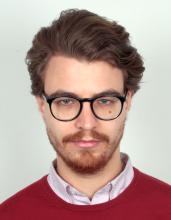
Having completed degrees in classics in Vienna and Berlin, I came to Cambridge as a visiting student to do research under the supervision of Tim Whitmarsh. The excellent experiences I enjoyed at the Faculty of Classics quickly convinced me that Cambridge would be the optimal place for my PhD studies: challenging supervision sessions have proved to be highly beneficial for my academic writing; the numerous distinguished scholars affiliated with the Faculty cover every subdiscipline of classics and all areas of ancient literature; research seminars provide platforms for insightful discussions; the vivid graduate community is professionally stimulating and, in addition, allows for conversations and activities beyond the scope of academia; last but not least, graduate students have the opportunity to gain valuable teaching experience both at a College and Faculty level.
Consequently, I applied formerly to the Faculty of Classics, where I am currently writing my PhD as a Gates Cambridge Scholar. My work focuses on Heliodorus’ Aethiopica, the latest and greatest Greek novel that has been preserved from Antiquity. In my thesis, I analyse Heliodorus’ sophisticated handling of his readers’ and characters’ states of knowledge, and discuss the influence on his novel of Late Antiquity’s prominent philosophical and religious movements (e.g. Neoplatonism and Christianity). Designed as a narrative puzzle, the Aethiopica offers itself to various—often ideologically charged—modes of reading and thereby celebrates Late Antique pluralism.
Olivia Elder
Olivia is in the writing up year of a PhD in sociolinguistics/ancient history, funded by a Peterhouse Research Studentship
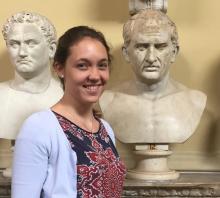
I came to Cambridge for my PhD in Classics having previously done an undergraduate degree in Ancient and Modern History and a Masters degree in Roman History at the University of Oxford. My doctoral research looks at multilingualism in the Roman world, and considers the importance of language to Roman cultural identity.
One of the things that attracted me to the Cambridge Faculty was its interdisciplinary nature. There are people within the Faculty with a huge range of research interests, and it is made very easy to talk to academics and graduate students working on other areas and approaches to the classical world in both formal and informal settings. My own research, which sits between ancient history and sociolinguistics, has benefitted greatly from this interaction between people from different disciplines.
The combination of the Faculty and the collegiate system, which provides an extra social and pastoral network, makes Cambridge a fun and extremely supportive environment in which to pursue a PhD. I have really appreciated the generous travel and conference funding that the Faculty offers. The Faculty kindly supported me in spending 3 months at the British School at Rome, an amazing opportunity that has been invaluable for my research.
Ed Millband
Ed has just completed the Cambridge MPhil, and is starting a PHD, funded by Trinity College
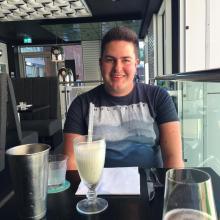
I first came to Cambridge to study classics as an undergraduate, and have now successfully completed the MPhil. I was drawn to the Classics Faculty at Cambridge by the reputation of its academics, many of whom are the leading lights within their field, and by the breadth of disciplines that can be studied within classics.
During my time as an undergraduate I became interested in the field of textual criticism and the transmission of classical Latin texts, a field in which Cambridge classicists have considerable expertise and which I was keen to pursue further during the course of my MPhil. Under the supervision of Stephen Oakley and David Butterfield, I did essays on emendation in Statius’ Siluae, the manuscript tradition of Claudian’s De Raptu Proserpinae, and interpolation in the pseudo-Senecan Octavia, in addition to a thesis entitled ‘A Textual Reappraisal of Caesar’s Bellum Gallicum’, which evaluated different approaches to textual problems in this well-known, but nonetheless challenging, work. These three essay topics, combined with my thesis work, enabled me to acquire a deeper understanding of the methodological frameworks associated with the evaluation of manuscript traditions and the emendation of Latin poetry, and of Latin literature more generally.
The opportunity to present my research at both the A Caucus (literature) Seminar and the Graduate Interdisciplinary Seminar has proved invaluable, and is a real strength of the MPhil at Cambridge. Not only have I developed presentational skills, but I have also been able to judge how receptive other students and academics are to my ideas, and to acquire a wealth of knowledge about Latin literature from my peers. I have also enhanced my knowledge of ancient literature and critical approaches by attending the main A Caucus Seminar and undergraduate lectures, at which all graduate students are welcome. The MPhil, with its emphasis on research, has also provided me with the skills required to formulate a viable research proposal and to bring it to fruition, skills crucial for my doctoral research. It is early days, but I plan to undertake research for a PhD on Tacitus’ Annales, with the aim of writing a philological commentary on Annales 13. I aim to combine my skills in textual criticism with those in literary criticism and intertextuality to produce an original and wide-ranging critical evaluation of this important work of literature.
The Faculty itself provides a stimulating working environment, and the impressive size of the Faculty library’s collection of books, periodicals and electronic resources has been a major attraction throughout my time at Cambridge, allowing students undertaking in-depth research at postgraduate level to have nigh on all their resources in one place. I have found the Faculty’s community of postgraduate students and professional academics to be extremely friendly and supportive, and they have provided me with many useful ideas for my own projects. I look forward to working with friends old and new for the next three years!
Vilius Bartninkas
Vilius did the MPhil at Cambridge and is now in the third year of a doctorate in ancient philosophy, funded by a Le Bas Cambridge Scholarship, Pembroke College, and the Arts and Humanities Research Council
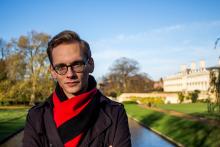
In the final years of my BA degree in philosophy at Vilnius University (Lithuania), I was searching for postgraduate courses in Classics, which would welcome an outsider like me. I was looking for a programme that offers not only an intellectually challenging course in ancient philosophy, but also a supplementary module in ancient languages. I found that perfect combination at Cambridge. The MPhil programme provided a stimulating and supportive learning environment, which enriched my knowledge of Greek and Roman philosophy through weekly seminars. In addition, I took part in the Intensive Greek classes, where I significantly improved my reading skills – to the extent that I could pursue a doctoral degree in ancient philosophy.
Currently, I am continuing my studies at Cambridge as a PhD candidate. My dissertation examines the relation between traditional religion and cosmic theology in Plato’s later works. But more broadly, during the last few years, I became interested in various questions relating to ancient cosmology, political theory, and ethics. Needless to say, the latter wouldn’t have happened without the supervision system, the vast resources of the Faculty library, and the people working here. I find Cambridge fascinating for the diversity of research interests among the fellows and postgraduates. The opportunity to discuss my thesis and their own academic projects with them has proved to be a continuous source of inspiration.
Michael Loy
Michael did the MPhil in Cambridge and is in the second year of a PhD in Greek archaeology, funded by the Arts and Humanities Research Council
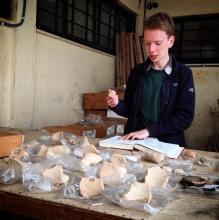
I studied for both my BA in classics and MPhil in classical archaeology here at Cambridge, where I gained a firm grounding in both Latin and Greek before choosing to specialise in the material culture of archaic Greece. Now I am working on my PhD, where I investigate how people, objects, and ideas moved around the Greek world. I am interested in particular in movements between the mainlands of modern-day Greece and Turkey - and in making some of these journeys myself!
The graduate community within the Faculty of Classics is exceptional. Not only is everyone extremely friendly and welcoming, some of the best ideas for my research have emerged from conversations with fellow PhD students, and from being invited to see things from the perspective of another period or specialisation. Our weekly Graduate Interdisciplinary Seminar (GIS) is a fantastic platform for sharing work in this way. Every Friday afternoon during term, PhD and MPhil students present ‘work-in-progress’ papers on anything from the history of the Greek alphabet to Epicurean philosophy, and after the seminar we adjourn without fail to the pub for further debate - perhaps less academic in nature, however.
Furthermore, the facilities and opportunities on offer to us as graduate students are second to none. Between the well-stocked collections of the Faculty Library (which has 24 hour opening for graduate students) and the University Library, the entire world of classical scholarship is readily available at our fingertips. Out of term, we are offered on occasion the opportunity to participate in archaeological fieldwork projects connected with the Faculty. So far, I have been involved in surveys and excavations in Britain, Greece, and Turkey. These have proved wonderful experiences both for honing my archaeological skills, and for making new friends and contacts outside the Faculty and Cambridge.
Di Yan
Di is currently in the third year of a PhD in Greek literature, funded by the CSC (China Scholarship Council)
I did my BA and MA in Boya (Liberal Arts) College of Sun Yat-sen University in China, before coming to Cambridge for my PhD study. My thesis is about Athenian autochthony and social order, and includes readings both of literary and philosophy texts. After two years of study in the Faculty, I can say that I found the interdisciplinarity here very supportive. Not only do I get frequent supervisions from my two supervisors in the Literary Caucus, but I can also seek advice from professors in other fields, all of whom are happy to help students like me. The literary seminar and philosophy seminar are my favourite events: both are open to all graduate students.
This summer I visited several Classics Departments in other universities. Only after the visit did I realize how spoiled we are in Cambridge – not every Classics Department has its own library, let alone such a large one, with almost all the books and journals I need at hand. Working in the Faculty library is an extremely pleasant experience – not only because one can find a book quickly, but because – with colleagues working together – one feels a strong sense of community. This sense of community makes conversation very easy.
I feel lucky to be a member of such a wonderful Faculty and I am grateful for all that I have experienced here. Besides my intellectual training, what is most precious is that I have encountered so many lovely people whom I will cherish for a lifetime.
Recent MPhil and PhD students
Ruth Allen
Ruth Allen recently completed a Cambridge doctorate in Roman art. She is now a curatorial intern at the Getty Villa in Malibu as part of the Getty Foundation’s Graduate Internship Program:
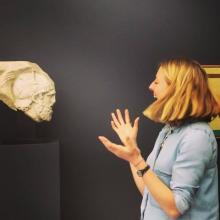
I returned to the Faculty of Classics in 2013 to begin my doctoral research with Dr. Caroline Vout. My thesis, ‘A cultural history of Roman engraved gemstones, their iconography, material, and function’ undertook a re-assessment of engraved gems of the Augustan and early imperial period, thinking in particular about their role as personal adornment – for both men and women, and for elites and non-elites – while also stressing the importance of viewing gems as objects, the material qualities of which were as integral to their function as their iconography.
Aside from excellent supervision and the opportunity to engage with and learn from senior Faculty members and fellow graduate researchers – both within Classics and in other departments – studying at Cambridge allowed me to develop other crucial skill sets and experience, from supervising undergraduates, to teaching adult learners, to producing videos on my research, and curating two public exhibitions.
Since graduating, I have spent time volunteering in the Department of Greece and Rome at the British Museum, and co-organising a conference and exhibition at King’s College London on the theme of ‘Modern Classicisms’, exploring the relationship between contemporary and classical art. I now work in the Antiquities Department at the Getty Villa in Malibu as a curatorial intern.
Tom Cowie
Tom Cowie has just completed the MPhil and is now embarking on a career in law
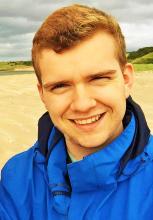
The concise nine months of the Cambridge MPhil course provided a valuable chance to extend my pursuit of Classics at graduate level. I used this opportunity to explore further Petronius’ Satyrica following earlier study of this novel during my undergraduate degree. The MPhil enabled investigation of several aspects of the Satyrica at a much deeper level than had previously been possible.
Besides access to the Faculty’s excellent teaching and academic resources, attending seminars with the rest of my MPhil cohort proved one of the most valuable parts of the course. Discussing formative ideas with peers and senior academics proved a rewarding experience, while the opportunity to present ideas to my seminar group helped to shape my thesis for the better.
The course functions equally well either as a stepping stone to doctoral study or as an end in itself. Having finished the MPhil I am now beginning the Graduate Diploma in Law, intending to pursue a career as a solicitor.
Benjamin Folit-Weinberg
Benjamin Folit-Weinberg did both the MPhil and a doctorate at Cambridge. Ben is now a Dahlem Research Center Post-Doctoral Fellow at the Freie Universität in Berlin.

My research examines the place of the figure of the hodos (Ancient Greek for ‘road’, ‘route’, ‘path’, or ‘way’) in archaic and classical Greek thought, particularly in respect to the emergence of the concept of method (Ancient Greek: ‘methodos’). My PhD explored the relationship between Homer and Parmenides and its relevance to the latter’s invention of extended deductive argumentation (or ‘hodos of inquiry’, as Parmenides calls it). As my investigation of this larger theme has progressed into a postdoctoral project, I have been struck by the ways in which my analysis has its roots in the work I did as an MPhil in the Classics Faculty.
There are many obvious benefits to working alongside a cohort of talented, knowledgeable graduate students – not to mention world-class scholars – in the Faculty library and elsewhere in the University. Over the years, however, I have come to appreciate a number of subtler, but no less decisive, virtues of undertaking a Classics PhD at Cambridge. One is the surprising degree to which Faculty members of all stripes were willing to share their time, wisdom, and expertise to help young researchers develop both their ideas and their careers (as a non-Brit who did his undergraduate degree in the US, I found this particularly important). Another is the way in which Cambridge’s rich tradition of public lectures, seminar series, symposia, debating clubs and discussion societies – not to mention the collegiate system itself – encourages specialists from a range of fields to participate in the same conversations; interdisciplinarity is structural feature of the Cambridge post-graduate experience, that is, and not merely a buzzword enjoying a vogue. I am certain that my PhD, which operated at the intersection of literary criticism, philosophy, intellectual history, and archaeology, and also relied on important concepts from anthropology, would have been considerably less robust had I not had the benefit of detailed feedback from peers and experts from each of these fields.
Upon competition of my PhD, I moved to Athens, Greece to work with the poet and translator A.E. Stallings, and to convert my PhD into a monograph; I also taught Ancient Greek for Pennsylvania State University’s semester in Athens. I am now a Dahlem Research Center Post-Doctoral Fellow at the Freie Universität in Berlin.
Emma Greensmith
After an undergraduate and MPhil degree in Classics at Cambridge, Emma Greensmith has just completed a Cambridge doctorate and is now Visiting Assistant Professor in Classics at Colgate University, New York.
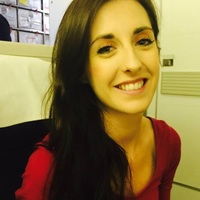
My doctorate was done as part of a Faculty research project entitled ‘Imperial Greek Epic: A Cultural History’, which involved a team of scholars from Cambridge and Oxford, all working on different aspects of Greco-Roman culture from the imperial period. My research focused on questions of literary identity in the Posthomerica by Quintus Smyrnaeus, a fascinating text from the 3rd century CE which claims to be the work of Homer.
I found Cambridge to be a fantastic environment to do research. The vast array of seminars, conferences and reading groups gave constant exposure to new perspectives; and the members of the faculty – from graduate colleagues to senior members – were invariably supportive, energetic and encouraging. Everyone is deeply committed to their own work, and interested in that of others. It is often said that writing a doctorate can be an isolating experience, but I never once found that in Cambridge.
I submitted my thesis in August 2017, and am currently Visiting Assistant Professor in Classics at Colgate University, New York.
Katherine Krauss
Katherine Krauss has recently completed the MPhil, specialising in Greek and Latin literature
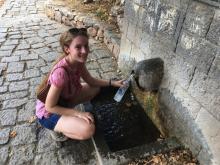
I came to the MPhil at Cambridge directly after having earned my BA in Classics at Columbia University. During my last year at Columbia, I had taken some graduate level seminars in both Greek and Latin literature, and I was excited by the challenge of pursuing my newfound interest in Greek and Latin literature of the first to third centuries CE in a more independent research environment. I found the MPhil exhilarating. By setting my own research programme, I was able both to push myself intellectually and explore the topics, no matter how niche, which captivated my attention. As my interests evolved throughout the year, I could tailor my essays and dissertation to reflect these changes. My supervisors were extremely supportive of my development as a scholar and generously shared their knowledge of the latest and most promising questions being asked in whatever new field of study I sought out.
I started my MPhil with an essay on the relationship between art and text in Pliny the Elder’s Natural History, and wrote my second essay on another ‘encyclopaedic’ text of the High Empire, Athenaeus’s Deipnosophistae. For my third project, I switched both genre and time period, and examined intertextual allusions to Aeneid 1 and 4 in Claudian’s fourth-century De Raptu Proserpinae. My dissertation analysed the significance of metaphorical references to the theatrical mask in Heliodorus’s Aethiopica and three polemical Christian treatises—the Contra Hieroclem, Gregory of Nyssa’s Contra Eunomium, and Cyril of Alexandria’s Quod sit unus Christus. Along the way, the wide range of seminars I was able to attend and reading groups in which I participated helped to refine further my areas of interest.
While it’s impossible to pinpoint my favourite part of the MPhil, the vibrant life of the Classics Faculty which surrounded me during those nine months has unquestionably shaped me into the scholar I am today. I hope to build upon the work done in my MPhil on Late Antique literature and theology in my PhD dissertation, which will cover the philosophical and theological significance of Cicero’s Republic, with special attention to Macrobius’s commentary on the Somnium Scipionis. More importantly, by asking me to take complete ownership of my academic work for the year, the Cambridge MPhil inspired me with a new level of confidence in myself and the work I produce.
Christina Tsaknaki
Christina Tsaknaki has recently completed a doctorate in Latin literature and is now in a permanent teaching post at Brentwood School in Essex
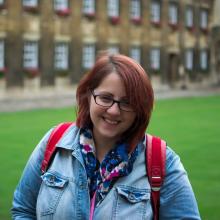
I joined Cambridge in 2012, after completing a BA in Greek Philology at the National and Kapodistrian University of Athens and an MSt in Greek and Latin Language and Literature at the University of Oxford. The four years I spent in Cambridge were undoubtedly some of the best years of my life, not only because of the superb academic facilities but also because I was lucky enough to be part of a strong and supportive Graduate community.
In addition to my research, I had the chance to develop my teaching skills: from my second year onwards, I was a Graduate Teaching Assistant and a College Supervisor. This amazing opportunity allowed me to see that my true passion was teaching and I decided to pursue a career as a teacher. I submitted my PhD thesis, a commentary on select poems of Ovid's Tristia 5, in July 2016, a few months before taking up a permanent post as Teacher of Classics at Brentwood School.
I now spend my time teaching students anything from porto, portas, portat to Plato's Apology and Tacitus' Annals. This breadth of subjects is a pleasant break from looking at two lines of Ovid for days at a time, but, since old habits die hard, I am also working on an A-Level commentary on Ovid's Heroides, which will be published by Bloomsbury.

